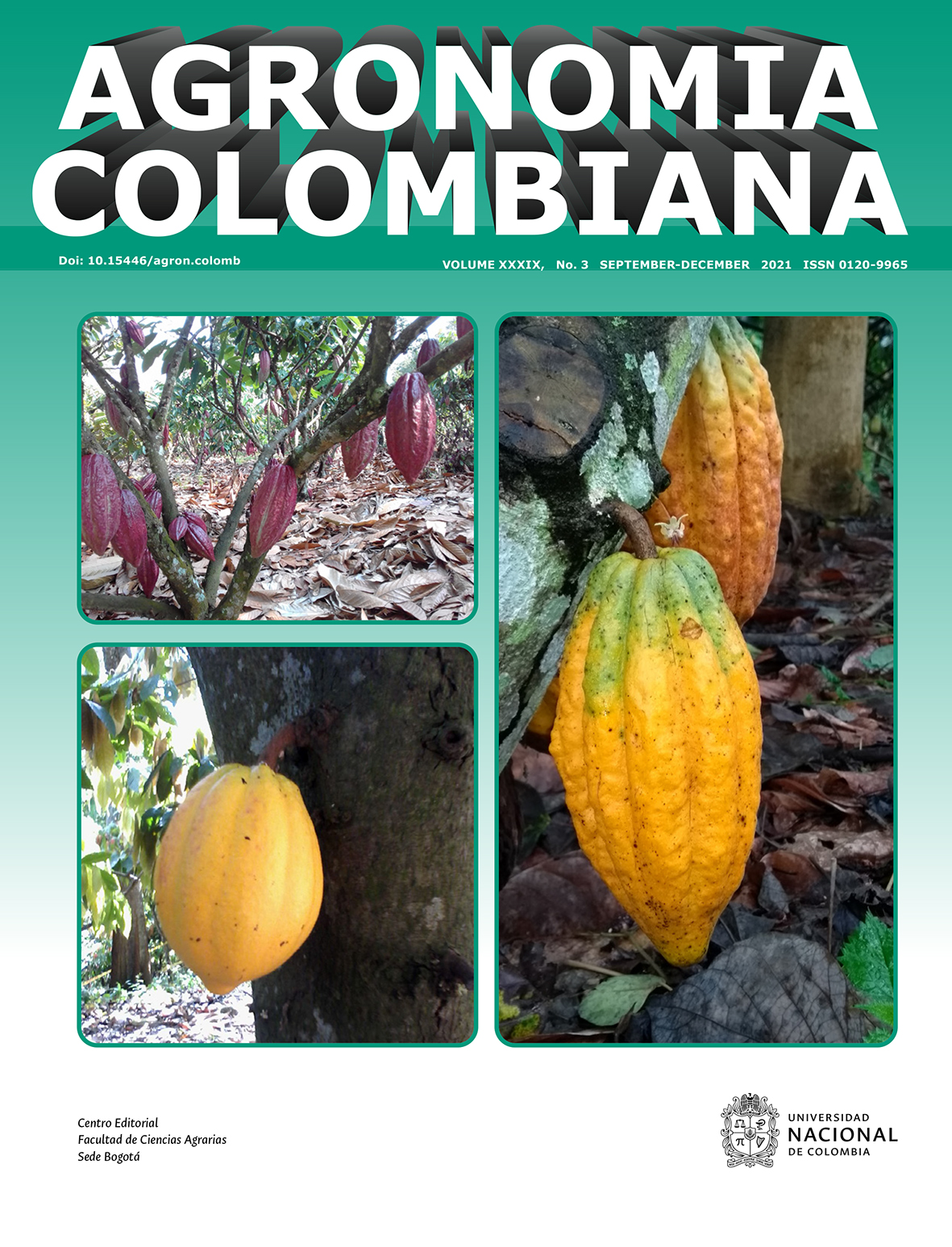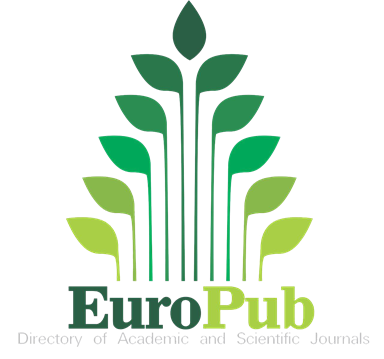Morphological variations and abundance of populations of the leafhopper Dalbulus maidis (DeLong) (Hemiptera: Cicadellidae) from the corn-producing region of Huila, Colombia
Variaciones morfológicas y abundancia de poblaciones del saltahojas Dalbulus maidis (DeLong) (Hemiptera: Cicadellidae) provenientes de la región productora de maíz del Huila, Colombia
DOI:
https://doi.org/10.15446/agron.colomb.v39n3.96432Keywords:
vector, morphometry, taxonomy, morphotypes, stunt (en)vector, morfometría, taxonomía, morfotipos, achaparramiento (es)
Downloads
Dalbulus maidis is known as the vector of the pathogens causing corn stunt complex disease that decreases crop yields to percentages higher than 90%. In the most affected areas of this disease, there is an increase in the abundance of this insect. This research evaluated the abundance and morphological characterization of populations of D. maidis collected from the region of Huila and determined the possible morphological variations within these populations. Leafhopper samples were collected in corn crops from 40 to 70 d after planting from eight localities in the corn-producing region of Huila. Taxonomic determination was carried out and twelve morphological characters were compared to evaluate the inter-population variations. Analyses of variance were performed to determine significant differences between individuals at three levels: abundance from specific corn-producing areas, morphotype, and sex. A total of 6,722 individuals were found, separated into four morphotypes. Total length, head length, and distance between the eyes showed significant differences. This study can serve as a basis for a better understanding of the vector for future research in the corn-producing regions of Colombia.
Dalbulus maidis es el principal vector de los agentes causales de la enfermedad del complejo del achaparramiento del maíz que disminuye el rendimiento del cultivo hasta en un 90%. En las áreas de mayor afectación por esta enfermedad se presenta un incremento en la abundancia del insecto. Esta investigación evaluó la abundancia y la caracterización morfológica de poblaciones de D. maidis recolectadas en el departamento del Huila y determinó posibles variaciones morfológicas dentro de estas poblaciones. Las muestras de los insectos fueron recolectadas en cultivos de maíz entre 40 y 70 d después de la siembra en ocho localidades de la región productora de maíz del Huila. Se llevó a cabo una determinación taxonómica y se compararon doce caracteres morfológicos para evaluar las variaciones entre poblaciones. Se realizaron análisis de varianza para determinar diferencias significativas entre los individuos en tres niveles: abundancia de áreas específicas de producción de maíz, morfotipo y sexo. Se encontraron 6722 individuos en total, separados en cuatro morfotipos. La longitud total, la longitud de la cabeza y la distancia entre los ojos presentaron diferencias significativas. Este estudio podría ser la base para una mejor comprensión del vector para futuras investigaciones en las regiones productoras de maíz en Colombia.
References
Agronet. (2019). Reporte: área, producción y rendimiento nacional por cultivo. Ministerio de Agricultura y Desarrollo Rural. https://www.agronet.gov.co/estadistica/Paginas/home.aspx?cod=1#
Ávila, C. J., & Arce, C. C. M. (2008). Flutuação populacional da cigarrinha-do-milho em duas localidades do Mato Grosso do Sul. Ciência Rural, 38(4), 1129–1132. https://doi.org/10.1590/s0103-84782008000400035
Bray, J. R., & Curtis, J. T. (1957). An ordination of the upland forest communities of southern Wisconsin. Ecological Monographs, 27(4), 325–349. https://doi.org/10.2307/1942268
CABI. (2020). Plantwise knowledge bank - maize leafhopper Dalbulus maidis distribution. https://www.plantwise.org/KnowledgeBank/datasheet/17847
CIMMYT & CIAT. (2019). Maíz para Colombia visión 2030. Centro Internacional de Mejoramiento de Maíz y Trigo, Centro de Investigación de Agricultura Tropical.
Dietrich, C. H. (2005). Keys to the families of Cicadomorpha and subfamilies and tribes of Cicadellidae (Hemiptera: Auchenorrhyncha). Florida Entomologist, 88(4), 502–517.
Druetta, M., Luna, I., & Gimenez, M. P. (2018). El achaparramiento del maíz por corn stunt spiroplasma (CSS). INTA, Ministerio de Agroindustria. https://inta.gob.ar/sites/default/files/inta_eeaquimili_corn_stunt_spiroplasma_en_maiz.pdf
Hawkins, B. A., & Lawton, J. H. (1995). Latitudinal gradients in butterfly body sizes: is there a general pattern? Oecologia, 102, 31–36. https://doi.org/10.1007/BF00333307
Hodkinson, I. D. (2005). Terrestrial insects along elevation gradients: species and community responses to altitude. Biological Reviews, 80(3), 489–513. https://doi.org/10.1017/S1464793105006767
ICA. (2019, August 15). El ICA y AGROSAVIA hacen equipo para fortalecer la sanidad de los cultivos de maíz en el Huila. Instituto Colombiano Agropecuario. https://www.ica.gov.co/noticias/ica-agrosavia-fortalece-sanidad-cultivo-maiz-huila
Kassambara, A., & Mundt, F. (2017). Factoextra: extract and visualize the results of multivariate data analyses (R package version 1.0.5.). https://cran.r-project.org/web/packages/factoextra/index.html
Knight, W. J., & Webb, M. D. (1993). The phylogenetic relationships between virus vector and other genera of macrosteline leafhoppers, including descriptions of new taxa (Homoptera: Cicadellidae: Deltocephalinae). Systematic Entomology, 18(1), 11–55. https://doi.org/10.1111/j.1365-3113.1993.tb00653.x
Krasnov, B., Ward, D., & Shenbrot, G. (1996). Body size and leg length variation in several species of darkling beetles (Coleoptera: Tenebrionidae) along a rainfall and altitudinal gradient in the Negev Desert (Israel). Journal of Arid Environments, 34(4), 477–489. https://doi.org/10.1006/jare.1996.0126
Larsen, K. J., & Nault, L. R. (1994). Seasonal polyphenism of adult Dalbulus leafhoppers (Homoptera: Cicadellidae). Annals of the Entomological Society of America, 87(3), 355–362. https://doi.org/10.1093/aesa/87.3.355
Lê, S., Josse, J., & Husson, F. (2008). FactoMineR: an R package for multivariate analysis. Journal of Statistical Software, 25(1), 1–18.
Meneses, A. R., Querino, R. B., Oliveira, C. M., Maia, A. H. N., & Silva, P. R. R. (2016). Seasonal and vertical distribution of Dalbulus maidis (Hemiptera: Cicadellidae) in Brazilian corn fields. Florida Entomologist, 99(4), 750–754. https://doi.org/10.1653/024.099.0428
Moya-Raygoza, G. (2002). Distribución y hábitats de Dalbulus spp. (Homoptera: Cicadellidae) durante la estación seca en México. Acta Zoologica Mexicana, 85, 119–128.
Nielson, M. W. (1968). The leafhopper vectors of phytopathogenic viruses (Homoptera, Cicadellidae) taxonomy, biology, and virus transmission. Technical Bulletin no. 1382. Agricultural Research Service, United States Department of Agriculture. https://naldc.nal.usda.gov/download/CAT87201370/PDF
Oksanen, J., Blanchet, F. G., Friendly, M., Kindt, R., Legendre, P., McGlinn, D., Minchin, P. R., O’Hara, R. B., Simpson, G. L., Solymos, P., Stevens, M. H. H., Szoecs, E., & Wagner, H. (2019). Vegan: community ecology package (R package version 2.5-6.). https://cran.r-project.org/package=vegan
Oliveira, C. M., Lopes, J. R. S., Dias, C. T. S., & Nault, L. R. (2004). Influence of latitude and elevation on polymorphism among populations of the corn leafhopper, Dalbulus maidis (De-Long and Wolcott) (Hemiptera: Cicadellidae), in Brazil. Environmental Entomology, 33(5), 1192–1199. https://doi.org/10.1603/0046-225X-33.5.1192
Oliveira, C. M., Oliveira, E., Souza, I. R. P., Alves, E., Dolezal, W., Paradell, S., Lenicov, A. M. M. R., & Frizzas, M. R. (2013). Abundance and species richness of leafhoppers and planthoppers (Hemiptera: Cicadellidae and Delphacidae) in Brazilian maize crops. Florida Entomologist, 96(4), 1470–1481. https://doi.org/10.1653/024.096.0427
Pinedo-Escatel, J. A., & Blanco-Rodríguez, E. (2016). Notas del género Dalbulus DeLong, 1950 (Hemiptera: Cicadellidae) en México. Folia Entomológica Mexicana, 2(1), 16–19.
R Core Team. (2020). R: a language and environment for statistical computing. R Foundation for Statistical Computing. https://www.r-project.org/
Rodríguez-Zabala, J., González, R., Correa, M. M., & Gómez, G. F. (2016). Análisis morfométrico de dos poblaciones de Anopheles (Anopheles) calderoni (Diptera: Culicidae) del suroccidente colombiano. Revista Mexicana de Biodiversidad, 87(3), 966–971. https://doi.org/10.1016/j.rmb.2016.06.005
Smith, R. J., Hines, A., Richmond, S., Merrick, M., Drew, A., & Fargo, R. (2000). Altitudinal variation in body size and population density of Nicrophorus investigator (Coleoptera: Silphidae). Environmental Entomology, 29(2), 290–298.
Struyf, A., Hubert, M., & Rousseeuw, P. J. (1997). Clustering in an object-oriented environment. Journal of Statistical Software, 1(4), 1–30. https://doi.org/10.18637/jss.v001.i04
Taylor, R. A. J., Nault, L. R., & Styer, W. E. (1993). Experimental analysis of flight activity of three Dalbulus leafhoppers (Homoptera: Auchenorrhyncha) in relation to migration. Annals of the Entomological Society of America, 86(5), 655–667. https://doi.org/10.1093/aesa/86.5.655
Triplehorn, B. W., & Nault, L. R. (1985). Phylogenetic classification of the genus Dalbulus (Homoptera: Cicadellidae), and notes on the phylogeny of the Macrostelini. Annals of the Entomological Society of America, 78(3), 291–315. https://doi.org/10.1093/aesa/78.3.291
Triplehorn, C. A., & Johnson, N. F. (2005). Borror and DeLong’s introduction to the study of insects (7th ed.). Thompson Brooks/Cole.
Varón de Agudelo, F., & Sarria Villa, G. A. (2007). Enfermedades del maíz y su manejo. Instituto Colombiano Agropecuario, Federación Nacional de Cultivadores de Cereales y Leguminosas. Produmedios.
Ward Jr., J. H. (1963). Hierarchical grouping to optimize an objective function. Journal of the American Statistical Association, 58(301), 236–244.
How to Cite
APA
ACM
ACS
ABNT
Chicago
Harvard
IEEE
MLA
Turabian
Vancouver
Download Citation
CrossRef Cited-by
1. Andrea Onelia Rodriguez-Roa, Jhon Mauricio Estupiñan Casallas, Camilo Ignacio Jaramillo Barrios, Buenaventura Monje Andrade, Carlos Alberto Abaunza González. (2024). Environmental and geophysical variables as indicators of the potential distribution of Dalbulus maidis (Hemiptera: Cicadellidae) in Huila, Colombia. Boletín Científico Centro de Museos Museo de Historia Natural, 28(2), p.13. https://doi.org/10.17151/bccm.2024.28.2.1.
2. Andrés Felipe Silva-Castaño, Liliana Franco-Lara, Helena Brochero. (2023). Exitianus atratus (Hemiptera: Cicadellidae) a vector of phytoplasmas: morphometry, DNA barcode and phylogenetic relationships for nymphs and adults from Colombia. International Journal of Tropical Insect Science, 43(2), p.495. https://doi.org/10.1007/s42690-023-00950-7.
Dimensions
PlumX
Article abstract page views
Downloads
License

This work is licensed under a Creative Commons Attribution-NonCommercial-ShareAlike 4.0 International License.
© Centro Editorial de la Facultad de Ciencias Agrarias, Universidad Nacional de Colombia
Reproduction and quotation of material appearing in the journal is authorized provided the following are explicitly indicated: journal name, author(s) name, year, volume, issue and pages of the source. The ideas and observations recorded by the authors are their own and do not necessarily represent the views and policies of the Universidad Nacional de Colombia. Mention of products or commercial firms in the journal does not constitute a recommendation or endorsement on the part of the Universidad Nacional de Colombia; furthermore, the use of such products should comply with the product label recommendations.
The Creative Commons license used by Agronomia Colombiana journal is: Attribution - NonCommercial - ShareAlike (by-nc-sa)

Agronomia Colombiana by Centro Editorial of Facultad de Ciencias Agrarias, Universidad Nacional de Colombia is licensed under a Creative Commons Reconocimiento-NoComercial-CompartirIgual 4.0 Internacional License.
Creado a partir de la obra en http://revistas.unal.edu.co/index.php/agrocol/.




















